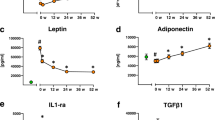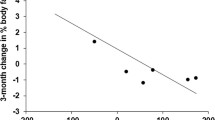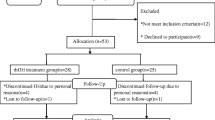Abstract
OBJECTIVE: Severe energy restriction in the treatment of obesity is limited by catabolism of body protein stores and, consequently, loss of lean as well as fat tissue. Growth hormone (GH), whose secretion is markedly impaired in obesity, is endowed with both lipolytic and protein anabolic properties. The aim of this study was to verify the effects of GH administration on body composition, plasma leptin levels and energy metabolism in obese patients undergoing severe dietary restriction.
DESIGN: Single-blind placebo-controlled study. Twenty obese women were fed a diet of 41.86 kJ/kg ideal body weight (IBW) daily for 4 weeks: 10 of them were randomly assigned to a 4 week treatment with biosynthetic GH (rhGH, Saizen, Serono, Rome, Italy), 1 U/kg IBW/week in daily subcutaneous injections; the other 10 patients, matched for age and BMI, received vehicle only.
SUBJECTS: Twenty women with simple obesity (age: 25.4±1.07 y, BMI: 35.9±0.35 kg/m2).
MEASUREMENTS: Plasma IGF-I and leptin, serum markers of bone turnover (serum bone isoenzyme of alkaline phosphatase, osteocalcin and urinary hydroxyproline), nitrogen balance, body composition (by DEXA), and resting energy expenditure (REE, by indirect calorimetry) were evaluated at baseline and after 4 weeks.
RESULTS: Mean IGF-I plasma levels, not influenced by energy restriction in patients receiving placebo, displayed a significant increase in the group treated with rhGH. The mean weight reduction and fat mass loss were not significantly different in the two groups (6.0±0.51 vs 7.2±0.30 kg, NS, and 5.36±0.460 vs 4.28±0.572 kg, NS, with rhGH and placebo, respectively). Likewise, plasma leptin levels decreased significantly in weight-reduced subjects receiving either rhGH (from 16.2±2.37 to 6.4±0.39 ng/ml, P<0.05) or placebo (from 14.3±2.55 to 7.7±3.77 ng/ml, P<0.05). On the contrary, the mean decrease of lean body mass (LBM) was significantly lower in the GH-treated patients than in those receiving vehicle (1.52±0.60 vs 3.79±0.45 kg, P<0.05). In keeping with these findings, the mean daily nitrogen balance was significantly less negative in the GH-treated subjects than in the vehicle-injected patients (mean of the 4 week daily urine collections −185.7±40.33 vs −363.9±55.47 mmol/d, P<0.05, respectively). Further, a significant reduction of mean REE was recorded in the energy-restricted placebo-treated patients (from 8807±498 to 7580±321 kJ/24 h, P<0.05), but not in the patients receiving rhGH (from 8367±580 to 8903±478 kJ/24 h, NS). Actually, when corrected for LBM, REE was even increased by GH administration (from 197.9±11.76 to 219.3±9.87 kJ/kg LBM/24 h, P<0.05), whereas it was unchanged in the placebo group (from 201.7±13.85 to 190.0±9.87 kJ/kg LBM/24 h, NS). A tendency of serum markers of bone turnover to increase was observed in the patients treated with rhGH, however with no changes in bone mineral content and density.
CONCLUSION: rhGH treatment, though unable to enhance diet-induced weight and fat mass reduction, was effective in stimulating IGF-I production and conserving LBM and increasing its energy metabolism even in the presence of severe energy restriction.
Similar content being viewed by others
Author information
Authors and Affiliations
Rights and permissions
About this article
Cite this article
Tagliaferri, M., Scacchi, M., Pincelli, A. et al. Metabolic effects of biosynthetic growth hormone treatment in severely energy-restricted obese women. Int J Obes 22, 836–841 (1998). https://doi.org/10.1038/sj.ijo.0800669
Received:
Revised:
Accepted:
Published:
Issue Date:
DOI: https://doi.org/10.1038/sj.ijo.0800669
- Springer Nature Limited
Keywords
We’re sorry, something doesn't seem to be working properly.
Please try refreshing the page. If that doesn't work, please contact support so we can address the problem.




